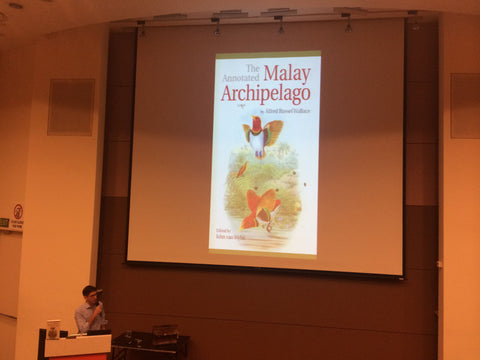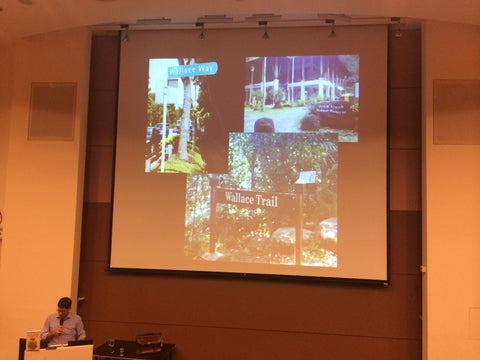Alfred Russell Wallace the “forgotten” hero: Why is Darwin more famous than Wallace? October 2, 2015 17:01
Ask the man on the street about natural selection, and you are bound to hear the name Charles Darwin. Indeed, it would be easy to conclude from this that Darwin is the de facto founder of natural selection as a concept. Yet, in recent years many have pointed to the concomitant, independent discovery of natural selection by Darwin’s contemporary, Alfred Russell Wallace, and lament the paltry amount of credit accorded to him.
Dr John van Wyhe, a historian of science at NUS and the editor of The Annotated Malay Archipelago, debunked this apparently “forgotten” reputation of Wallace as Darwin’s equal at a lecture given at the Singapore Science Centre on 26 September 2015. Dr van Wyhe’s Annotated Malay Archipelago is the first ever fully annotated version of Wallace’s classic account of his travels in Southeast Asia to appear in English, updating the original text with explanations, a bibliography of related material, and an in-depth introduction. Wallace’s The Malay Archipelago was an immediate success following its publication in 1869. Captivating generations of audiences with its descriptions of places and people, the book even inspired the likes of Joseph Conrad and David Attenborough.

Wallace the “forgotten” hero: Why is Darwin more famous than Wallace?
Dr van Wyhe opened the lecture with the very question that many have recently posed in response to the independent discovery of natural selection by both Darwin and Wallace, namely – if this phenomenon was something that the pair had discovered (albeit separately), why is Darwin so much more famous than Wallace?
As an inquiry that began in the 1950s, this has since spiraled into claims – according to Dr van Wyhe – that Wallace was not only unjustly “forgotten” but also the “victim of a conspiracy”. Some have even put forward that Darwin had plagiarized Wallace’s work. In fact, the more books are written about Wallace, the more firmly his status as a “forgotten” hero seems to be cemented, Dr van Wyhe observed. Exaggerated statements thus abound about Wallace being “the greatest field biologist”, and even Black Books comedian Bill Bailey has exclaimed with injustice that natural selection “was known as a joint theory [by Darwin and Wallace] for decades!”

We might perceive Wallace to be unfairly left out of the limelight then, only because we have been told that this is so, Dr van Wyhe argued. Additionally, this “forgotten” descriptor of Wallace may perhaps have been arrived at with the false impression of Wallace’s relatively “humble background” that persuades one of his deserving better recognition. Wallace was certainly no peasant, having been sent to a school for gentlemen in his youth, for example.
The real, historical Wallace
If not a “forgotten” hero, who could the real Wallace be? After his school days and a voyage to the Amazon, Wallace arrived at Singapore in 1854, Dr van Wyhe delineated. It was here that Wallace made expeditions to Bukit Timah, trips which would form part of his material for The Malay Archipelago. Wallace’s influence as a naturalist still resounds among parts of the island today, with roads and nature trails named after him, for instance.

Southeast Asia was also where the idea of natural selection first came to Wallace in 1858. Penning down his thoughts on the subject, Wallace decided to first send these off to Darwin, who he felt would be sympathetic to ideas of such a nature. (These notions had previously also occurred to Darwin 20 years ago in 1838, though nothing had been published by him at that point.) Upon reception, the choice was made to have Darwin’s and Wallace’s ideas published together in a paper. However, very few took notice of this scholarship at that time.
With this piece of information, some might clamour again for the rightful recognition of Wallace’s role in discovering natural selection. Yet, more importantly, as Dr van Wyhe put it, the household recognition of only Darwin’s name today is quite simply because it was his book which had convinced people of the verity of natural selection. Wallace’s discovery notwithstanding, Darwin’s The Origin of Species still contained other numerous ideas that Wallace had never conceived of, a fact that the latter freely admitted to. Indeed, Wallace was even part of the flurry of voices commending Darwin’s unprecedented work at that time. Rounding things up, it may perhaps be more accurate then to view the Wallace-Darwin relationship as one filled not so much with animosity, but academic camaraderie, Dr van Wyhe concluded.
The Annotated Malay Archipelago is now available at NUS Press.
